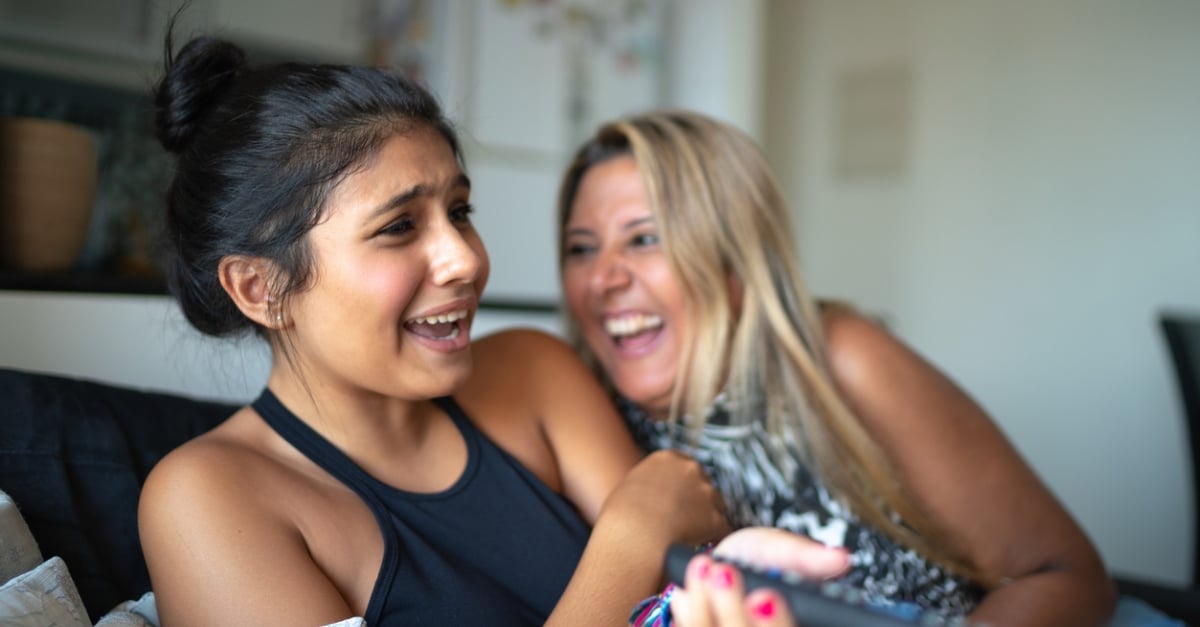
Door slamming and back talking? Sounds like you have a teenager at home. You've tried everything to get your kid back in line, but nothing seems to stick. It's like from one day to the next, your sweet, clingy kid suddenly became embarrassed by you and is rude enough to voice that opinion — in public! And as if that moody behavior wasn't challenging enough, these unprecedented times have probably kept your whole family cooped up together for months. All you want is to keep your kid safe and help them make good choices. But you're not getting through, and it's wearing you down. If much of this rings true, then ask yourself a simple question: Is my teenager stealing my joy?

If trying to control your teenager has you distracted at work, stressed, anxious, angry, or depressed, then it may be time to ease up on your teen for the sake of your own mental health. Letting go, even just a little, is an act of self-care.
You spent a decade and a half protecting and providing for your child, which can make easing control over your teenager seem strange and unfamiliar. And yet, giving up the need to closely manage your teen's behavior and choices can be a liberating experience. Letting go will be a bit scary at first, but you'll get the hang of it.
When dealing with your teenager, it's important to put this new phase into perspective. You'll go around in circles asking yourself why your teen behaves a certain way, but the answer to that is in their wiring. The brain of a teenager is quite different from that of an adult. It's growing, maturing, and making new connections, and it won't be fully mature until your teen has reached their mid-20s.

The downside is that your teenager really does have a harder time knowing right from wrong. They're more likely to take risks and misread emotions. But the upside is that the teenage brain has plasticity, and that means there's room to learn amazing new things and think in creative ways.
While there's wiggle room for misbehaving, it's important to know when your teen's strange behavior is less typical and more troubled. This is a crucial time in your child's life, as mental disorders can begin to present, and teens are more vulnerable to stress and anxiety. And let's not forget the hormonal changes they're going through. Premenstrual syndrome, or PMS, can bring on everything from fatigue to rage in your teenage daughter.
Boys are susceptible to mood swings as well, and navigating the space between boyhood and manhood can be stressful. So while you're practicing the art of easing up, you still need to keep a close eye on your teen. Between peer pressure, sexual experiences, body image, academic load, and experimentation with drugs and alcohol, your teen may be on a difficult journey through young adulthood.
So how exactly does a parent practice letting go? You may want to begin by talking things out with your partner or those in your support circle. Voicing what you're feeling can help you focus on what part of your relationship with your teen is most disruptive. If you have access to professional services like a therapist, make this conversation a priority.

Now that you've zeroed in on the most agitating elements of your relationship with your teenager, try to envision what it would look like if you let your teen manage the situation on their own. Do you think they would fail? Do you think they wouldn't make the right decision? What if you let go of those doubts and allow your teen a chance to navigate on their own? This could mean allowing your teen to manage their own schedule, wear what they want, or (gasp!) stay out a bit late with their friends. These allowances differ between families, and you need to focus on what's best for yours.
Here's another question for you. Do you constantly feel the need to be right? Well, the good news is that giving up the need to be right can be beneficial for your relationship with your teenager. Yes, you may think you have more experience and you know better, but no one likes to be constantly corrected. Allowing your teenager space to figure things out can relieve some of the strain you may be feeling, and it could be emotionally and intellectually freeing for your teen.
Next time you and your teenager are headed for a clash, consider a cost analysis first. Ask yourself what is the emotional and mental cost of battling it out with your teenager over whatever you're dealing with at the moment. Pick your battles and choose them wisely, because there are more on the horizon, and you need to practice self-care in between.
Remember how the airline attendants would remind you to place the oxygen mask on yourself first? That's what this is about. Putting yourself first, maybe not all the time, but sometimes so you can not just survive these chaotic years with your teenager, but enjoy them too.




